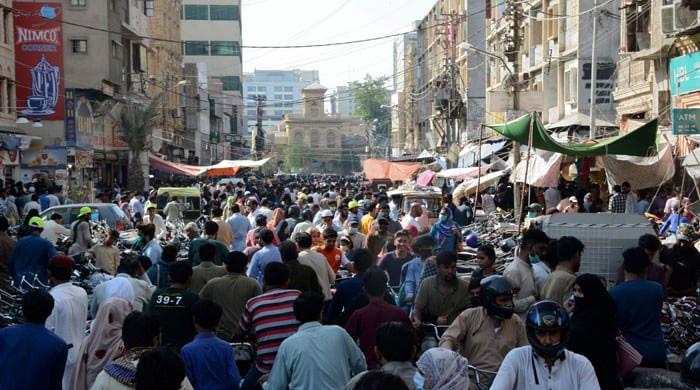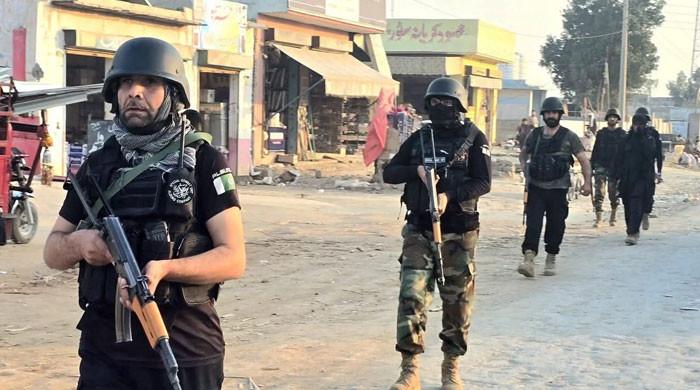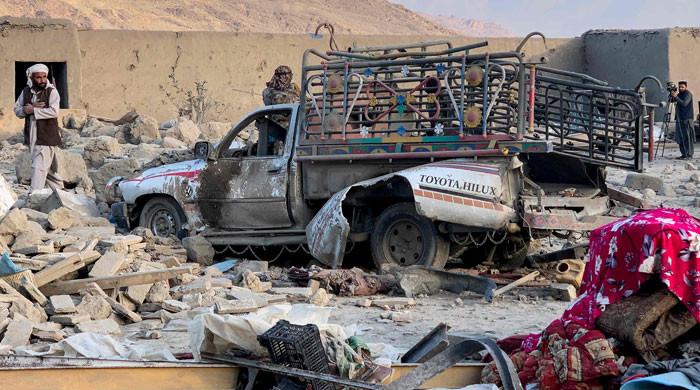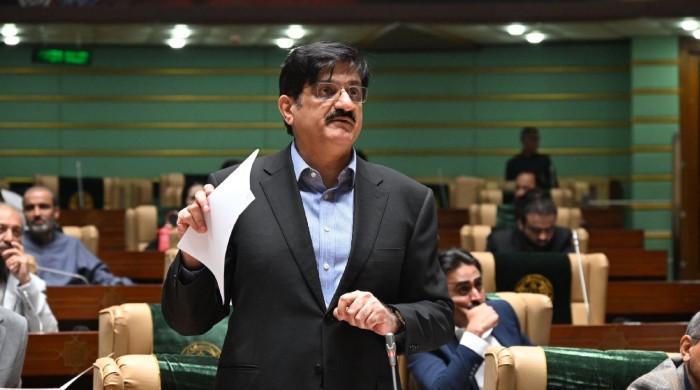Judges servants of the state, accountable to public: Justice Isa
Justice Isa, Gen Lodhi, Hina Rabbani speak at Future of Pakistan 2018 Conference at London School of Economics
November 05, 2018
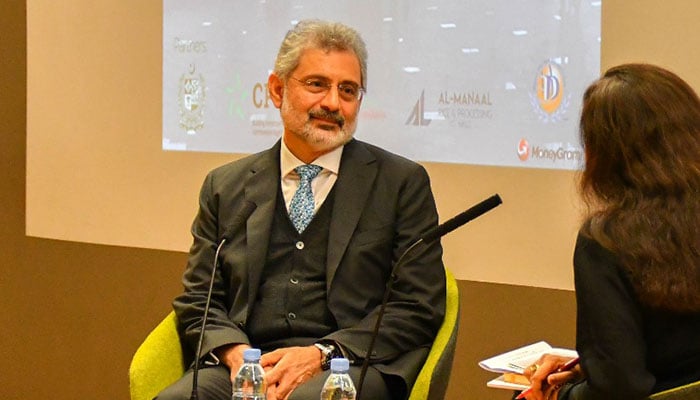
LONDON: Justice Qazi Faez Isa has said that judges are servants of the state and accountable to the public because they get salaries from the public kitty and politicians are accountable to the electorates as it’s the voters who decide the fate of politicians seeking public office through votes.
The senior Supreme Court judge was addressing a packed audience for the “Future of Pakistan 2018” Conference at the London School of Economics (LSE)’s Sheikh Zayed Theatre in London.
Justice Isa said that lawyers are accountable to their clients because they run private practices and don’t draw salaries from the public exchequer whilst judges are accountable to the state and therefore to the general public. He said they are responsible for meeting the hopes and expectations that the public has from judges of delivering justice on merit. He said that it is job of the judges to adjudicate and issue verdicts based on evidence and not assumptions. He said that judges listen more – to all differing views – and speak less to ensure that justice is done after fair hearings. The conference was organised by Abdurrehman Chinoy, the Queen Mary Pakistan Society President and President of Chinoy Group UK, in association with the LSE Pakistan Development Society led by Muhammad Afzaal Akhtar.
Speakers included former foreign minister Hina Rabbani Khar, General (R) Nadeem Lodhi, renowned economist and former State Bank President Ishrat Hussain, Hina Butt, MPA Punjab, Dr Amber Darr, Hassan Miraj, PTI UK leader Sahibzada Jahangir and CPIC CEO Zeeshan Shan.
Justice Isa explained how he was tasked to head the Supreme Court’s inquiry commission into August 8 Quetta bombing of the legal community and to catalogue failures in Pakistan’s counterterrorism and counterinsurgency strategies which he found during his investigations of about two months. Justice Isa told the audience that the militarisation and weaponisation of religion and the culture of guns and violence was introduced gradually even before the time of General Zia and had hijacked the religion of peace and love. He said that no institution should seek popularity and focus on doing work because the best test of popularity is at the ballot box and anyone seeking popularity should contest elections to see how popular he or she is.
Pakistan’s renowned economist Dr Ishrat Hussain, who is also Prime Minister Imran Khan’s economic advisory council member, told Geo News that the Tehreek-e-Labaiak sit-in has been hugely destabilising to the economy of Pakistan; investors’ confidence has been shaken due to disturbance caused at the country level; market confidence has been shaken. He said that the government did the right thing by signing an agreement with the Labaik group. “Any more destabilisation could have damaged Pakistan’s economy further.” He told the audience that Imran Khan has decided to take harsh and unpopular decisions to turn around Pakistan’s economy. He spoke about the decay of institutions and said that Army has picked up mediocre and ordinary brains and turned them into the best brains but the politicians picked up the best brains in the form of civil servants but turned them into ordinary. He blamed dysfunctional institutions for the current state of affairs in Pakistan.
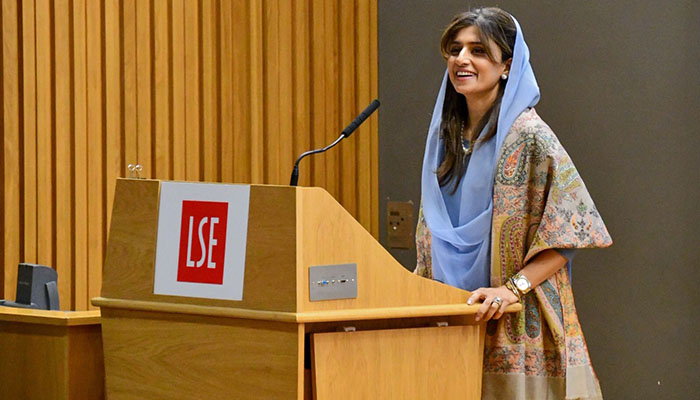
Former foreign minister Hina Rabbani Khar said that Imran Khan’s PTI has a history of capitulating before the extremist forces and agreeing to the demands of Khadim Rizvi’s party was the latest addition in the track record of Imran Khan. She said that a message has been sent to the world that Pakistan is captive to rule of mobs. She said that PPP and PML-N refused to play politics over a religious issue – unlike PTI – and offered full political support to PTI but the government chose to surrender.
She said that space for the civilian government shrunk under the PML-N government as other institutions increased their space but under the PPP government space for civilian rule was gained and increased.
Khar added that it’s really important to preserve the sanctity of institutions and monopoly and arbitration over violence and who is right and who is wrong should rest with the state and there should be no confusion about that. She said, “I take responsibility for what happened in Pakistan when I was the foreign minister, there were disagreements with the military but then we made the military realise and there was cordial approach from the military and we worked smoothly with each other on key issues through dialogue and understanding.”
General (R) Nadeem Lodhi explained the security complications of Pakistan and how civil-military relations work. He said that Pakistan faced pressures from its neighbours and its energies were focused on thwarting security threats to its existence at all times. He said threats to Pakistan were a reality and peace and normalcy in the country was guaranteed by the military. He said that economic sovereignty was linked with peace.
Answering a question, General Lodhi said that many of the demands made by Pahstoon Tahafuaz Movement (PTM) were legitimate and “you cannot blame your enemy if they exploit your weaknesses”. He said that Pakistan Army has been involved in a big fight against terrorists in the areas which have been affected and it believes that demands and grievance are genuine and was actively working towards addressing these issues.
Speaking about the latest dharna and threats issued, General Lodhi said that those who issued threats to the army chief and the judges should be prosecuted to establish the writ of the state. “You have to face them fairly and squarely.”
CPIC’s Zeeshan Shah said that the China Pakistan Economic Corridor (CPEC) is not a debt trap. “China put its trust in Pakistan when the world had turned their backs on Pakistan. Today energy crisis in Pakistan has been dealt with to a large extent and that has been made possible only through Chinese investment and help. To portray Chinese help in negative light is a disservice to Pakistan,” he said, adding that Gwadar was set to change the face and fate of the region.
“The fact that China invested billions in Pakistan when no other country was willing to look at Pakistan is a positive sign. China chose to invest in Pakistan when we were globally isolated,” the former Apprentice star said.
Sahibzada Jahangir said that under Imran Khan, Pakistan was ready for economic take-off. He said that Imran Khan has announced 5 million homes scheme for the poor.
Abdurrehman Chinoy, the sponsor and chief organiser said: “I am glad that this has turned out to be the biggest such conference at the historic LSE on the future of Pakistan. It was a wonderful conference where everything was discussed in detail. It was a pleasure to see students engaging with policymakers and questioning them, sometimes asking most difficult questions.”
Chinoy further said: “I do not belong to any party. My party is Pakistan and my agenda is to promote anything that promotes a true image of Pakistan and I will continue to do so. It’s unfortunate that our negative news gets highlighted more and no attention is paid to the good things coming out of Pakistan.”




